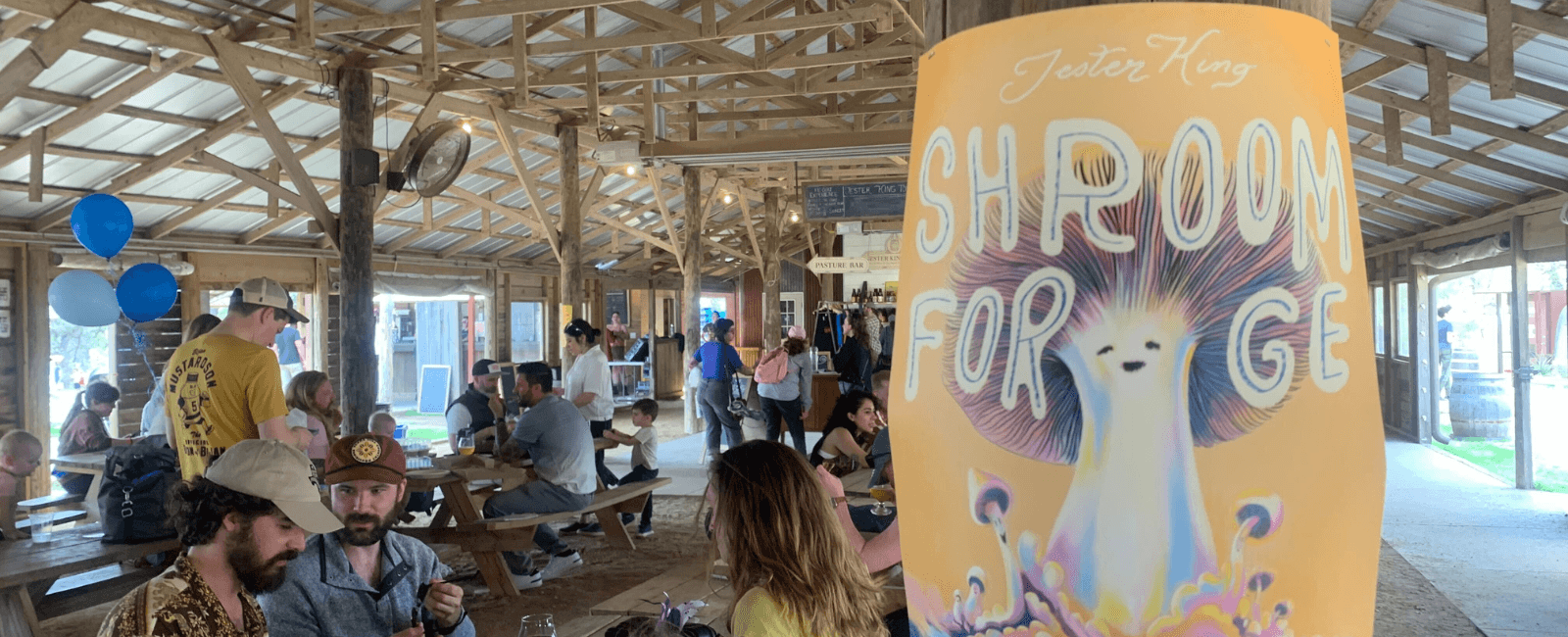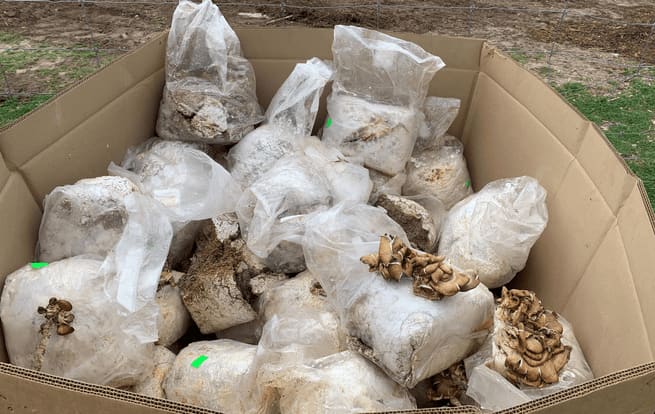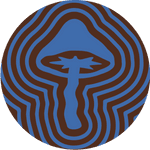

On Sunday, February 26, over two hundred myco-enthusiasts flocked to the Texas Hill Country to experience Shroom Forge, an all-day mushroom fest presented by the Central Texas Mycological Society.
The family-friendly event, located at Jester King Brewery outside of Austin, Texas, featured workshops fit for the whole family, including DIY bucket-tekking, myco-composting, and gardening with fungi. For the little ones not so interested in mycelium blocks, a craft table set up with all of the fixin’s encouraged kids to make their own Texas Star Mushrooms- the official mushroom of Texas, thanks to the efforts of the CTMS.
After a day of DIY, guests were invited to stick around the Jester King grounds to enjoy CTMS’s myco happy hour, featuring discounted appetizers and the brewery’s own Snörkel farmhouse ale, brewed with alderwood smoked sea salt and oyster mushrooms grown by Smallhold in Austin.
Live music from Austin’s own Dayeater and UK band Fuzz Lightyear closed out the event on the brewery patio, where guests ended their day of mycology happy, full, and a bit more knowledgeable about the power of mushrooms.
What is the Central Texas Mycology Society?

Founded in 2019, the Central Texas Mycological Society, or CTMS, is a self-proclaimed “member self-directed non-profit organization” that serves to educate Central Texas about the power, uses, and accessibility of mushrooms in our everyday lives.
Through events like Shroom Forge, CTMS aims to educate Texans about the importance of the role of fungi in protecting our natural landscape and promoting sustainable practices to give back to the Earth as much as we take.
Angel Schatz of the CTMS leadership circle says events like Shroom Forge are one of many experiences and workshops they offer. Over the course of 2022, CTMS held over ninety events, including online speakers, in-person hands-on workshops, and more myco-happy hours like that at Jester King.
As a non-profit, CTMS offers memberships that help to support the growing mycological efforts and events happening across Austin and the Central Texas area. These memberships, for a price, allow mycologists to attend remote and in-person events, receive resources like mycelium for their gardens, and more benefits.
With over 900 members already involved, it seems as though this symbiotic relationship resembles the same mycelial network CTMS aims to educate the public about.
“We want to reach people,” said Shatz, “mycology isn’t just for a certain group of people, everyone should be exposed to the power of mycelium.”
A Sunday for shrooms
Beginning just before noon on Sunday, February 26, Shroom Forge invited mycologists, young and old, to BYO-bucket for their first featured workshop of the day, “Bucket-tek” cultivation.

“Bucket-Tek” cultivation
Although mushrooms are the bread and butter of the CTMS, their myco-mission to save the world also includes sustainable practices, seen from top to bottom of the event. While buckets were available for participants to buy the day of, CTMS urged guests to bring anything they had from home to create their own cultivation pod, including cardboard boxes, laundry hampers, or milk crates.

The workshop, led by CTMS volunteers and leadership, showed guests how common household items can be reused and repurposed to compost materials such as hay, mulch, cardboard, and other organic substances to nurture the soil in household or community garden spaces.
The real star of the show, however, were the hundreds of mycelium blocks provided by Austin’s own Hi-Fi Mycology Farm- previously fruiting bodies of Lion’s Mane, Reishi, and other mushrooms, now to be crushed and added to the perfect compost cocktail.
Not only does “lasagna-ing” these materials, as the CTMS leadership says, work to break down typical food waste or other organic materials, but the practice also creates the perfect environment to grow your own ‘shrooms.
While some foragers made their buckets alongside their friends, partners, or dogs, some mycologists were starting young- children of all ages were welcomed to make their own buckets, run around with Jester King’s goats, or make their own Texas Star Mushroom at the crafts table.
Myco-Compost

The second workshop, myco-composting, used the same organic materials and mycelium blocks to demonstrate inoculation on a tree. With soil missing around its roots after a deep freeze weeks earlier, CTMS volunteers detailed the need for soil restoration to keep the tree alive and standing upright.
Volunteers first drilled fallen tree branches to the ground around the perimeter of the tree to act as a container for the composting materials. After the wall of branches was finished, participants then laid down sheets of cardboard to pile soil, mulch, and hay on top to serve as a base layer of biodegradable components to nurture the tree.
Finally, mycelium. The boxes upon boxes of mycelium blocks around the Jester King grounds served as the sprinkles atop this dirt cake, crumbled to then catalyze the composting process and deliver precious nutrients back to the tree.
Eventually, rainfall cements these organic materials and thus begins the mycelium’s process of breaking down and returning nutrients to the soil and tree. After a few months, said CTMS leadership, the previous depression around the tree’s roots would look unrecognizable, with new soil, grass, and perhaps some baby mushroom growth.
This group effort for Jester King’s tree doesn’t need to be a one-time experience, expressed CTMS- this practice is as easy as picking up some old recycling, soil, and a mycelium block (here for Central Texas residents) and giving your backyard tree some R&R. Then, wait for some rain, let your mycelium do what it does best, and watch as your soil and tree transform over time.
Fungi in the garden

The final workshop of the day took what participants learned in those prior and applied it to many an Austinite’s bread and butter: the garden!
Jester King brewery’s tilled fields provided the perfect location to demonstrate the power of mycelium in growing fruits and vegetables, and in this case, hemp. Rows and rows of troughs across the property were lined with cardboard sheets, soil, and mycelium to exemplify the proper method to successfully use these organic materials to foster healthy produce and plants.
Although participants spent most of their time on Sunday in the hot sun and down in the dirt, children and adults alike took joy in smashing mycelium blocks into tiny pieces and squishing their cool, kinetic-sand-like texture.
While most of the blocks used at Shroom Forge were provided by Hi-Fi Mycology and Smallhold Farms, Chris Kennedy of the CTMS’s Healthy Soils, Healthy Trees program says that finding these gems is more accessible than it seems.
“We’ve partnered with these farms that would typically compost these blocks after a single flush, or harvest, of mushrooms,” said Kennedy, “but now we can pass out free mycelium to anyone who wants it in Austin.”
Using the same techniques as seen at Shroom Forge, the Healthy Soils, Healthy Trees team has partnered with the City of Austin and has planted and used mycelium to maintain over 50 trees in the last year. Their main goal is to collect data on mycelium implementation and help save the “urban forest” that lives in Central Texas, which anyone can contribute to in their own backyards- it all starts with you and mycelium.
And hey, you might even find some straggler mushrooms growing on your mycelium block as nature’s way of saying “thanks.”
More Shroom Forge, more mycelium

After a long day of composting, cultivation, and craft beer, Shroom Forge attendees were encouraged to join CTMS for their myco-happy hour on the Jester King Brewery patio.
Guests snacked on mushroom specials from the JK kitchen and sipped on Snörkel on tap to live music by Dayeater and Fuzz Lightyear, which made for a perfectly funky evening following a long day of mycology. Most Forgers, like myself, even brought home a mycelium block and a tekked-out bucket for composting and cultivating.
CTMS is hopeful to return to Jester King brewery in the future for another Shroom Forge, but in the meantime will continue to throw events and other workshops across Central Texas in the future.
For now, I’m taking this block of mycelium and putting it to use in my own balcony garden. Not only do I hope to give my plants new life, but hopefully I’ll begin my own mushroom cultivation journey. Whatever happens, what I learned from Shroom Forge and the CTMS will certainly be “lasagna’d” in my brain forever.
Special thanks to Jester King Brewery and the Central Texas Mycological Society for their aid in this article’s cultivation. For more information on the CTMS and other mycological happenings in the Central Texas area, visit https://www.centraltexasmycology.org.


